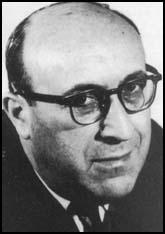Mark Gayn

Mark Julius Gayn, the son of Russian-Jewish parents, was born in a small town on the border of Manchuria and Mongolia in 1909. After the Russian Revolution Gayn obtained work in the Red Army library at Vladivostok, Russia. In 1926 Gayn studied at the Soviet Institute for Teachers, Librarians, and Propagandists.
Gayn moved to the United States where he attended Columbia University in New York. After he finished his education he had spells working for Japanese and Chinese news agencies. During the Second World War Gayn covered the Eastern Front for Newsweek and Time Magazine.
In 1944 Gayn became an American citizen. The following year, the Federal Bureau of Investigation raided Gayn's New York apartment and discovered 60 classified documents. He was later charged with illegally procuring secret government information from the Office of Strategic Services (OSS). Many of these documents revolved around the battle plans of Chiang Kai-shek, who at that time was fighting against the war Mao Zedong. Although four of his co-conspirators were indicted, the charges against Gayn were dropped and he was allowed to resume his journalistic career.
Recently released FBI files show that Gayn was working as a spy for the Soviet Union. In his book, The Man Who Knew Too Much, the investigative journalist, Dick Russell argues that a deal was done and that Gayn "kept his freedom in return for serving as a "double agent" at some point in the future".
After the war Gayn worked as a journalist for The Washington Post. He made regular visits to communist countries where he had private meetings with leading government officials. Gayn visited Mexico City several times between September 1962 and September 1963. In January 1963 he visited Strategic Air Command headquarters in Omaha where he made detailed notes on what the American military knew about Soviet and Cuban defences. Soon afterwards he travelled again to Mexico City before moving on to Cuba.
Richard Case Nagell later claimed that Gayn obtained information that suggested that there was a conspiracy to assassinate John F. Kennedy. This information was passed onto the Federal Bureau of Investigation.
Gayn also visited the Soviet Union every year between 1964 and 1970. He also visited China several times and obtained two private meetings with Mao Zedong.
Mark Julius Gayn died in 1981.

